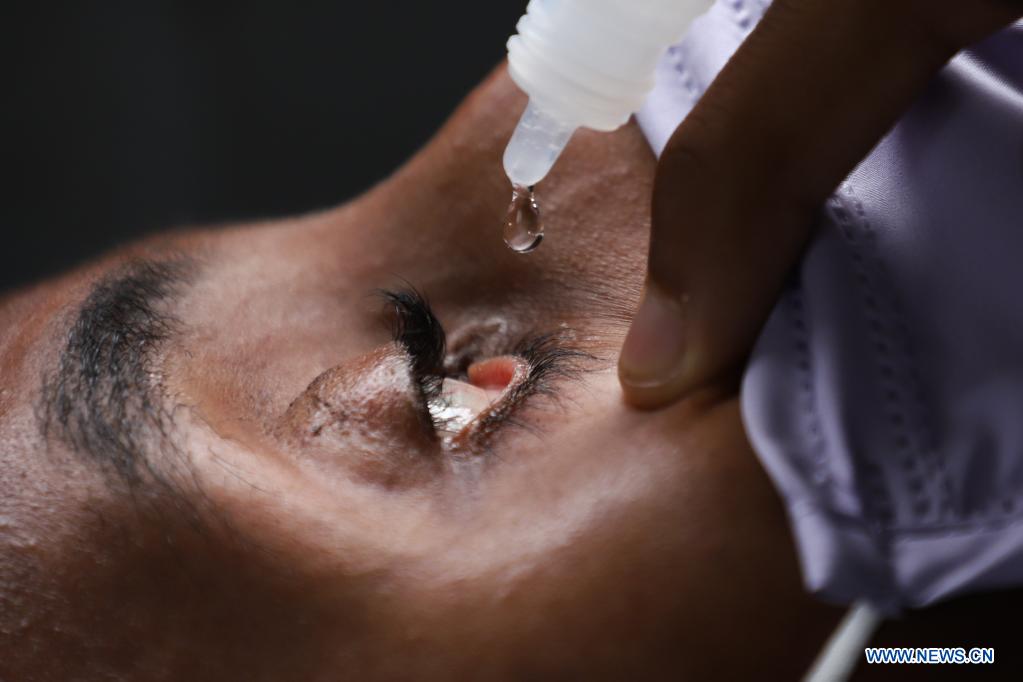
Eye drops are put into a patient's eye who received a corneal transplant surgery in the Eye Bank of Ethiopia in Addis Ababa, Ethiopia, on June 30, 2021. The Eye Bank of Ethiopia, one of Africa's first-ever eye banks, is giving reliefs to thousands of people who are unable to see due to damage on cornea -- a window-like part of an eye that helps someone to see clearly. (Xinhua/Michael Tewelde)
ADDIS ABABA, July 15 (Xinhua) -- Tariku Hussien, 21, is one of the over 2,500 Ethiopians who regained their sights in corneal transplant surgery in the Eye Bank of Ethiopia.
The bank, one of Africa's first-ever eye banks, is giving reliefs to thousands of people who are unable to see due to damage on cornea -- a window-like part of an eye that helps someone to see clearly.
"I had lost interest in life as my family and relatives were not helpful to me," said Hussien who started to work as a machine operator in China-assisted Ethiopia-Djibouti Standard Gauge Railway service after he regained his sight following the transplantation.
According to a recent study by the Ethiopian Ministry of Health, more than 300,000 Ethiopians were blind due to corneal scarring.
In Ethiopia, corneal damage is largely caused by infectious disease such as trachoma, injury and natural factors, according to Menen Ayalew, Medical Director of the Eye Bank of Ethiopia at the Menelik II Hospital in Addis Ababa, capital of Ethiopia.
Ayalew, who is one the few cornea surgeons in the East African country, said that the bank has restored the sights of some 2,532 needy people until the end of 2020 using corneas that were recovered from the dead persons.
"We replace the damaged cornea of a patient with healthy one's which passed through rigorous check up using high tech machines and equipment," the medical director stated.
Hussien associates regaining his vision as a second chance of life.
"I had lost my interest in life until my cornea was replaced. Now, I have achieved my dream of joining university as a computer science student," he said.
"I am very much grateful to the person who donated his or her corneas and the Eye Bank who helped me to regain my vision and enjoy a brighter future," he added.
Once a cornea is retrieved from a dead person, it will be diagnosed against transmittable diseases such as HIV/AIDS, Hepatitis B and C, Syphilis, COVID-19 before transplantation takes place.
The bank collects corneas from the dead persons either from the dead persons who pledged to donate their corneas to the bank post-mortem, as well as from a corpse of a dead person who passed away in hospitals.
According to Ayalew, the collection of corneas from corpses of dead persons who passed away in hospitals is conducted through consent agreements from the deceased person's close kin.
"In both cases, the collection of the corneas should be done within eight hours before the organs of the dead persons start to rot," Ayalew said.
Since 2003, the Eye Bank of Ethiopia has obtained more than 10,000 pledges to donate their corneas post-mortem.
Ayalew, however, indicated that the bank has so far managed to collect insignificant numbers of corneas from those people.
"This is due to low awareness among the public about the very functions of the bank and its poor tracing system," she said.
The former Ethiopian president, Girma Wolde-Giorgis, who officially inaugurated the Bank back in 2003, was the first individual to pledge his corneas to the bank.
According to the medical director, the late Ethiopian president's family were true to the former president's promise as they collaborated with the Eye Bank of Ethiopia in recovering his corneas upon his death in 2018.
The East African country introduced the corneal transplantation service in 2003 after a tripartite agreement was reached between ORBIS international, the Eye Bank of Ethiopia and the Addis Ababa City Administration.
The bank retrieves corneas of a dead person as young as two years.
Frew Shibeshi, 32, is another recipient of a foreign cornea and able to see after the transplant with the help of the Eye Bank of Ethiopia.
"Words cannot explain how delighted I was when I saw people, objects and everything around me after my sight was restored. It was like coming from darkness to light," Shibeshi told Xinhua in a recent interview.
Patients at the eye bank have to pay around one-fifth of the processing fee of the cornea transplant, amounting to about 100 U.S. dollars. The balance is covered by the Ministry of Health and Sight Life, an international NGO which replaced ORBIS international.
Currently, the number of cornea transplantation centers in Ethiopia has grown to nine including in regional cities such as Mekele, Jimma, Hawassa, Gonder and in private hospitals in Addis Ababa.
"Giving someone sight can mean changing them from being a burden to being a productive member of society," Menen said. Enditem